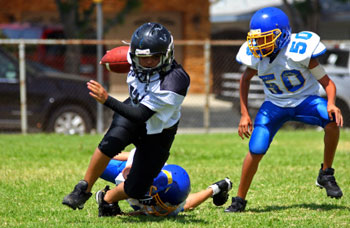A new clinical report from the American Academy of Pediatrics suggests that student athletes who have suffered concussion following head injury may need to take a break from academic learning.

The AAP says that student athletes who have concussion may need to take some time out from academic learning, or symptoms could worsen.
In a report released at the American Academy of Pediatrics (AAP) National Conference and Exhibition in Orlando, FL, the authors say that children and adolescents with concussion may need more time to adjust to learning following injury, and that returning to academics could "worsen" concussion symptoms.
The AAP say they based their report on expert opinion and an adaption of a concussion management program developed at the Center for Concussion at the Rocky Mountain Hospital for Children in Denver, CO.
Symptoms of concussion
Concussion is a form of traumatic brain injury that can be caused by a blow to the head or a fall that jolts the head and brain.
According to the Centers for Disease Control and Prevention (CDC), concussion can occur in any sport or recreation activity, therefore all parents, coaches and athletes should learn signs and symptoms of the injury.
Some common symptoms as stated by the CDC are:
- Headache or "pressure" in the head
- Nausea or vomiting
- Double or blurry vision
- Sensitivity to noise and/or light
- Concentration or memory problems.
AAP recommendations following concussion

The AAP says that student athletes who have concussion may need to take some time out from academic learning, or symptoms could worsen.
The authors say that previous research has shown that it usually takes up to 3 weeks for a school-aged student to recover from concussion.
A 2010 AAP clinical report suggests that students may need to stay home from school for a period of "cognitive rest" if symptoms are severe, and those with "mild or tolerable" symptoms who return to school should have some "adjustments" made to assist their learning.
These may include shortening of the school day, reduction of workload, or allowance of more time to complete assignments or take tests.
The authors add that students with symptoms that last longer than 3 weeks may need more "formalized academic accommodations."
"Students appear physically normal after a concussion, so it may be difficult for teachers and administrators to understand the extent of the child's injuries and recognize the potential need for academic adjustments," says Dr. Mark Halstead, a lead author of the report.
"But we know that children who've had a concussion may have trouble learning new material and remembering what they've learned, and returning to academics may worsen concussion symptoms."
Each child 'requires individualized approach'
With these factors in mind, the AAP recommends that a team consisting of the students' pediatrician, family members and individuals related to the children's academic timetable and physical fitness should work together to ensure the best approach for their return to learning following concussion.
Dr. Halstead explains:
"Every concussion is unique and symptoms will vary from student to student, so managing a student's return to the classroom will require an individualized approach.The goal is to minimize disruptions to the student's life and return the student to school as soon as possible, and as symptoms improve, to increase the student's social, mental and physical activities."
The AAP notes that further research is warranted regarding the role and effects of cognitive rest following concussion, and to better understand the best ways to help a student who is recovering from concussion.
Earlier this year, Medical News Today reported on a study suggesting that damage to the brain caused by concussion can last for decades following the original head trauma.
No comments:
Post a Comment